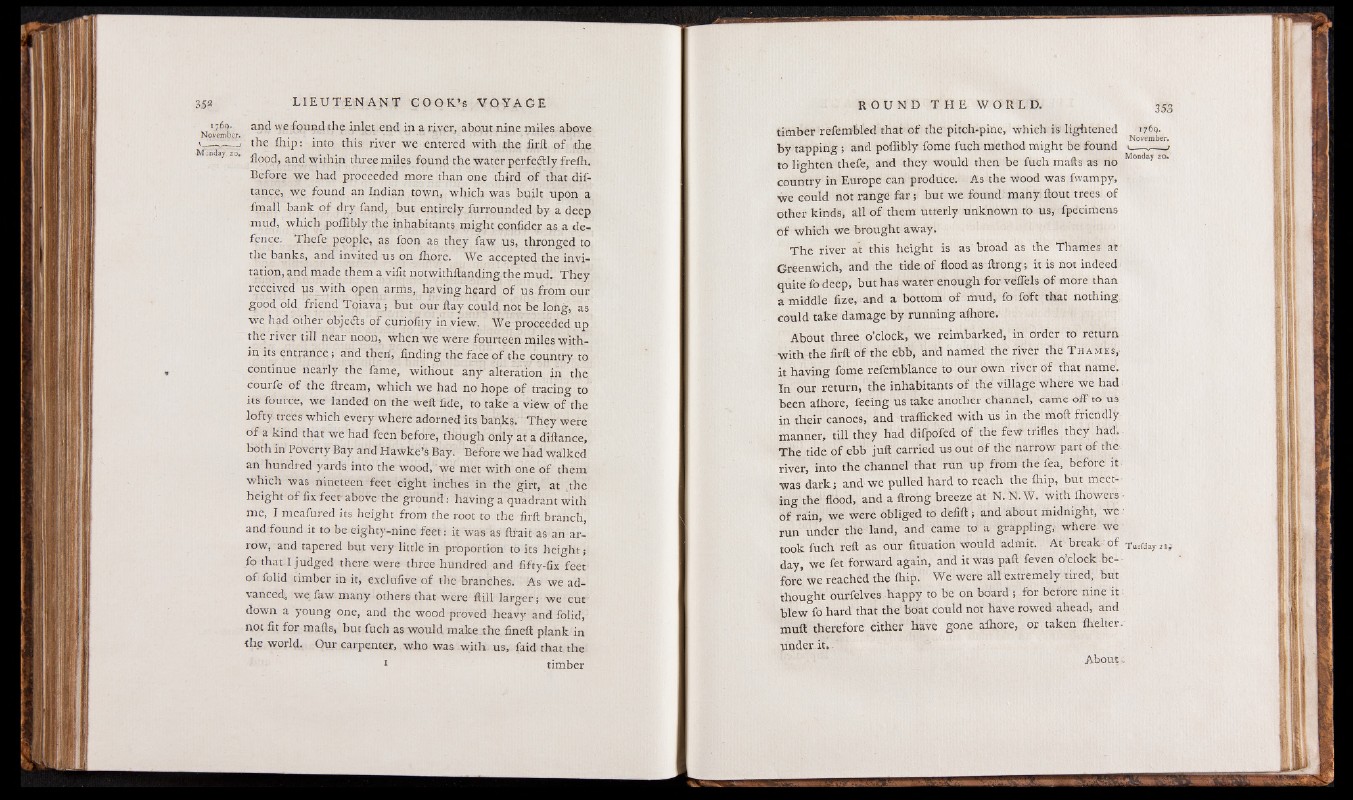
i 7-6q* November.
Monday. 20.
and wefipund the i,nlpt end in a river* about nine miles above
the fliip: into this river we entered with the firfl of the
flood, and within three miles found the water perfectly frefh.
Before we had proceeded more than one third of that dif-
tance, we found an Indian town, which was built upon a
final! bank of dry fand, but entirely furrounded by a deep
mud, which poffihly the inhabitants might confidei: as a defence.
Thefe people, as foon as they faw us, thronged to
the banks, and invited us on fhore. We accepted the invitation,
and made them a vifit notwithftanding the mud. They
received us with open arms, having heard of us from our
good old friend Toiavaj but our flay could not be long, as
we had other objects of curiofity in view. We proceeded up
the river till near noon, when we were fourteen miles within
its entrance; and theri, finding the facie o f the country to
continue nearly the fame, without any alteration in the
courfe of the ftream, which we had no hope of tracing to
its fource, we landed on the weft fide, to take a view of the
lofty trees which every where adorned its banks. They were
of a kind that we had feen before, though only at a diftance,
both in Poverty Bay and Hawke’s Bay. Before we had walked
an hundred yards into the wood, we met with one of them
which was nineteen feet eight inches in the girt, at ,the
height of fix feet above the ground.- having a quadrant with
me, I meafured its height from the root to the firft branch,
and found it to be eighty-nine feet: it was as ftfait as an arrow,
and tapered but very little in proportion to its height;
fo that I judged there were three hundred and fifty-fix feet
o f folid timber in it, exclufive of the branches. As we advanced,
we faw many others that were ftill larger; we cut'
down a young one, and the wood proved heavy and folid,
not fit for mails, but fuch as would make the fineft plank in
the world. Our carpenter, who was with us, laid that the
1 timber
timber rcfembled that of the pitch-pine, which . is lightened 1769. r 1 November.
by tapping ; and pombly fome luch method might be round <— — t
to lighten thefe, and they would then be fuch mails as no M°"day 2°'
country in Europe can produce. As the wood was fwampy,
we could not range fa r ; but we found many flout trees of
other kinds, all of them utterly unknown to us, fpecimens
of which we brought away.
The river at this height is as broad as the Thames at
Greenwich, and the tide of flood as ftrong; it is not indeed
quite fo deep, but has water enough for veffels of more than
a middle fize, and a bottom of mud, fo foft that nothing
could take damage by running alhore.
About three o’clock, we reimbarked, in order to return
with the firft of the ebb, and named the river the Thames,
it having fome refemblance to our own river of that name.
In our return, the inhabitants of the village where we had
been alhore, feeing us take another channel, came off to us
in their canoes, and trafficked with us in the mod friendly
manner, till they had difpofed of the few trifles they had.
The tide of ebb juft carried us out of the narrow part of the
river, into the channel that run up from the fea, before it
was dark; and we pulled hard to reach the {hip, but meeting
the flood, and a ftrong breeze at N. N. W. with Ihowers -
of rain, we were obliged to defift; and about midnight, we
run under the land, and came to a grappling, where-we
took fuch reft as our fituation would admit. At break-of Tu2fday-2W
day, we fet forward again, and it was paft feven o clock before
we reached the fhip. We were all extremely tired, but
thought ourfelves happy to be on board ; for before nine it
blew fo hard that the boat could not have rowed ahead, and
muft therefore either have gone alhore, or taken {belter,
under it ,.
About.